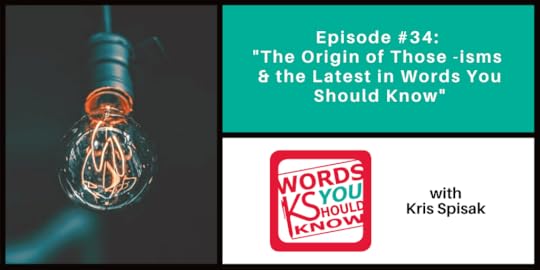#34 – The Origin of Those -Isms & the Latest in Words You Should Know
A few stolen minutes out of your day to talk words and communication, because our daily lives are surrounded by the evolution and influence of words. Forget the grammar police. There is so much more to this conversation.

Welcome to Episode 34.
The Latest in Word, Language & Writing NewsBefore we get to all those “-isms” that fill our brains and fill the headlines (e.g., Patriotism, Heroism, Feminism, Consumerism, Textisms, Egalitarianism, Meliorism)—I’m just talking about language here, folks, including the fascinating history of this ‘ism suffix—let’s talk the latest in words, language, and writing news.
Here’s your update.
When I first saw this article, I smiled. Now that we’re a couple weeks into 2021, I’m wondering if I actually agree…
Fast Company recently published an article arguing that the interrobang should be revived in 2021. Of course, if you can’t imagine what an interrobang is, imagine a question mark (?) and an exclamation point (!) on top of one another. It’s a little-known punctuation mark that represents excited disbelief. What‽ Seriously‽
It was invented by New York ad executive Martin Speckter of Type Talks Magazine in 1962, when he decided there should be a mark to replace the pairing of multiple question marks and exclamation points side by side used to effect a certain tone (???!!!). The interrobang did go as far as being included in some typewriters, but its moment seemed to have faded away. Until this year‽ Seriously‽ Well, it does strike a certain frantic incredulity, which might be fitting. I’ll hold it still under consideration, though.
In other news, neuroscientists have recently published findings sharing that people’s words alone can actually shape the makeup of your brain and influence physical reactions in your body. Words have power. We know this.
To quote Lisa Feldman Barrett PhD on TED.com, “Ultimately, your family, friends, neighbors and even strangers contribute to your brain’s structure and function and help your brain keep your body humming along.”
Yes, we know an internal reaction is provoked if I ask you the question, “Did you unplug that iron?” Or if you receive the spoken, hand-written, even texted message “I love you,” your body will react. But your actual brain structure? Fascinating. The details to the full research are in my show notes.
And I’ll close out my news with a question. CBS news says that Joe Biden’s dog, Major, is having his own “indoguration.” Not “inauguration.” “Indoguration.” Playful banter? Too far? Discuss amongst yourselves. You’ve got to find the humor these days, right?
English Language History & TriviaThere are so many debates going on in the world today, between friends, neighbors, politicians… oh, this is where heat rises and emotions churn—what it’s all doing to our brain structures, I don’t know, but I’m curious. But get ready for lightbulbs to flick on in your minds. Well, at least in terms of how the English language deals with big belief systems.
Let’s talk Isms, the origins of the “-ism” suffix, and how it’s popped up in fascinating ways throughout history.
In the beginning, of course, the I-S-M ending that is added onto words came from the Greek suffix -ισμός (-ismos), which was added to the end of words to create abstract nouns of action, state, condition, or doctrine.
I’m sure if you try, you can think of a lot of Isms: Calvanism. Buddhism. Agism. Sexism. Autism. Baptism.
They’re everywhere.
Now, the first known -isms were used in English in about 1680, and big ones soon jumped into our vocabularies. Thank you, Enlightenment-era philosophers.
However, did you know that in the mid 1800s, a political movement in the American South built an entire platform on being anti-Ism? No, I’m not leaving out any part of that word, actual phrasings just referred to these “isms” as if this was a stand-alone word, synonymous with radical lofty beliefs.
On September 5th and 9th, 1856, a newspaper, specifically Richmond, Virginia’s Examiner, ran editorials on “Our Enemies, the Isms and their Purposes.” Now this writer or these writers were responding to big ideas in the spotlight in the day, like slavery abolitionism, pacifism, transcendentalism, spiritualism, and new in about 1848ish, feminism. There’s a fascinating and honestly disturbing political cartoon published in 1956 that you can find in my show notes that speaks to this fear of Northern Isms in relation to the presidential campaign of Republican nominee Freemont, who was running against Democrat James Buchanan and Know Nothing nominee Millard Fillmore. Perhaps it was partially that campaign against radical Republican “isms” that allowed for Democrat James Buchanan’s victory.
There’ so much historical context to add in here. Yes, Republican and Democratic parties have had dramatically different leanings over the years, and yes, “the Know Nothing party” was a real political party. They were formally known as the Native American party, though “Native American” at this time meant descendants of colonists and early settlers rather than indigenous Americans as we would define “Native Americans” today. They were a nativist party, which began as a secret society and later had chapters in nearly every major city in the country. And yes, this Know Nothing Party nominee in 1956 was Millard Fillmore, who had already been president of the United States, elevated from his position of Vice President in 1850, when President Zachary Taylor died of Cholera. But the Whig party he had claimed as his own had dissolved, so the Know Nothing Party it was!
The “Know Nothing” nickname came to be because members of this party were to respond that they “knew nothing” if asked about their nativist organizations. There’s so much more, from xenophobia over the waves of Irish and German immigrants entering the county during this time to conspiracy theories and beyond. Truly, fascinating. Thought provoking. Especially these days. I have extra articles from the Smithsonian and Britannica in my show notes for those interested, but back to those ‘Isms…
But perhaps we should wrap up this conversation about -isms with George Eliot. Not only was she a highly respected author, even if she was writing under a male name, she also coined the term “meliorism,” or the belief that the world’s suffering is healable if we could all work together, sometimes defined as the belief the world tends to become better over time. Meliorism is in that space between optimism and pessimism, with a degree more hope than what a “realist” might claim.
That’s an -ism I can absolutely get behind.
Language ChallengeToday, let’s go with two quick follow-ups to George Eliot’s ideas. Spelling bee time: do you know how to spell the word “camaraderie”?
Think on it for a moment. It begins with the letter C, but what comes next? Can you do it?
If you can, I’ll say marvelous, but oh no! How do you spell that word? Marvelous. Marvelous. Is there one L in marvelous? Or two? Hmm…
The answers, as always, can be found on my website.
Personal Update:For my personal update, happy New Year to those of you who are listening as this new episode is released! I’m recording this on January 12, 2020.
2020, as I’ve noted, was a big year for me in terms of my own books. Get a Grip on Your Grammar, which had first been published by Career Press in 2017 in paperback, was released in hardback in 2020, and it was also published in India with a partnership with Harper Collins India. My two workbooks also released in 2020, The Novel Editing Workbook and The Family Story Workbook, both projects that I have been overjoyed to see take off. I do have another book or two that I plan to start pitching in 2021, but for now, my focus is the continuation of my virtual book tour for The Family Story Workbook.
These times are so strange, so challenging, yet so revolutionary. Because of live-video event possibilities, I’ve teamed up with writing organizations and indie bookstores to have events across the U.S. (from my own home-base, of course). But Richmond, Virginia, Austin, Texas, New York, New York, Philadelphia, Atlanta, Savanna, Phoenix… I can’t wait to see where else this all goes. I love connecting with readers and writers and leading writing and editing workshops, so this virtual tour isn’t something I’m planning on stopping anytime soon. Stay tuned for the launch of StoryStopTour.com. Soon. Not Yet. Maybe for those listening at a later date, it’s already there. Ooh, the magic of audio recording.
Are these words affecting your brain waves? Because you know that your words can take you absolutely anywhere too? Well, maybe not physically in this COVID-19 era, but when it comes to ideas, absolutely.
There are so many -Isms worth exploring, right? Maybe you’ll invent your own -ism too. What’s your philosophy, of the moment, of the year, of your life’s mission? I can’t wait to hear what you come up with.
Sign up for my English language tips and trivia email newsletter for more articles and podcasts like this.
If you like what you’ve been hearing, don’t forget to subscribe to this podcast (via Apple Podcasts, Android, Google Podcasts, Stitcher, or RSS) so you’ll never miss out on another word you should know. Many thanks to those of you who have taken the time to rate my show wherever you listen.
Words. Language. Communications. We’ve got this.
The post #34 – The Origin of Those -Isms & the Latest in Words You Should Know appeared first on Kris Spisak.



